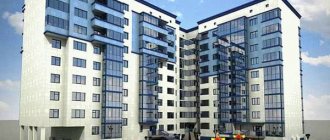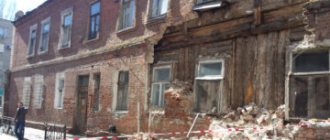Home / Housing disputes / Emergency housing / Is it possible to register in emergency housing
For many people, the issue of registration in an apartment is a pressing issue. In the absence of a suitable place to live, the choice falls on emergency housing. Especially if a person buys an apartment in such a building or moves into a living space with a relative or spouse. Registration allows you to get a job, enroll your children in kindergarten, apply for a loan, register at a clinic, or move in with your family. Often emergency housing is located in the city center, in a convenient and developed area - this is a big plus.
The question arises: is it possible to register in emergency housing? Judging by the practice and questions of our fellow citizens, this is a difficult question. Let's discuss what the difficulties are, when they can refuse and what to do in different situations.
Under what conditions is registration possible?
Emergency housing stock has a special status. This includes homes with a damage percentage of 70% or higher. The peculiarity of emergency buildings is the degree of wear and tear - the destruction of load-bearing walls, roofs, foundations and other elements. Living in such houses is problematic, but people are often forced to wait for a reaction from the authorities. If the house is subject to demolition, the residents are moved to new apartments or paid the redemption price. Good options, but what if registration is really necessary?
What does the law say?
The law does not contain provisions that prohibit registration in unsafe and dilapidated houses. Usually they are guided by Federal Law No. 5242-1 “On the Right of Citizens...” dated July 25, 1993, which establishes a list of cases for restrictions on emergency housing. But it doesn't say that registration is impossible . But it is said, for example, about a direct ban on the privatization of emergency housing stock.
At the same time, it is worth paying attention to the explanations from the Moscow government. They state that registration in apartments of a dilapidated building is allowed to a limited number of persons, namely those who are born into the family of owners or marry the owner of the apartment. Everyone else is usually checked by special commissions.
Features of registration
Meanwhile, situations may be different. The status of housing is also important - privatized or municipal apartments in a dilapidated building.
Let's highlight the main points:
- If the housing is not recognized as emergency, there will be no difficulties with registration - in this case, the person acts according to the standard procedure.
- If the house is recognized as unsafe, there is a 99% chance that the authorities will refuse registration.
- Refusal of registration can be appealed in court.
- In order to register in the apartment of citizen-owners, you need to obtain their consent. Registration of a municipal apartment will require not only the consent of the tenant and his family members, but also a request to the local administration (landlord).
- The municipality will refuse registration if after it there will be less than 12 m² of living space in the apartment per person (Clause 1, Article 70 of the Housing Code of the Russian Federation).
- Parents-owners have the right to register their child even in emergency housing. The law states that the place of residence of children is the place of residence of the mother or father (Article 20 of the Civil Code of the Russian Federation).
- Registration of a newborn does not require the consent of the father if the baby lives with the mother - while the mother must give consent to register the newborn in the father’s apartment.
The overwhelming number of disputes arise in the case of registration in emergency housing. If the house is officially registered and is subject to resettlement and demolition, no official will give permission for new people to move in. Otherwise, the authorities would have to allocate new apartments to all residents, taking into account new arrivals - and the housing stock is limited. All you have to do is either come to terms with it or defend your rights through the courts.
Example:
Georgy was looking for housing in his hometown. Soon his cousin contacted him, who had just put up a 1-room apartment for sale. The catch was that the housing was in disrepair. However, according to the seller, the authorities have not yet had time to inspect the building and make a conclusion about its emergency status. Georgy had limited finances and did not want to take out a mortgage. At the same time, he knew that when the house was resettled, the owners would be given apartments in new buildings. He agreed to the purchase and sale. After the parties shook hands, Georgy went to the MFC and registered in a 1-room apartment. The owner could not be refused registration, even if the house was listed as unsafe. Since Georgy owns an apartment, that means he is registered at the address of his property.
How to register a person if the house is declared unsafe?
As we said, the course of the procedure depends on the situation - is the house declared unsafe or not yet? If the housing is officially “demolished,” registration is only possible through the court. And vice versa, if the building’s accident risk has not yet been determined, the process will go easily and quickly.
Step-by-step instruction
Registration is carried out by the departments of the State Administration for Migration Issues under the Ministry of Internal Affairs of the Russian Federation, the so-called “passport offices”.
Somewhere in the regions there are Federal Migration Service Directorates that perform similar functions. You can also submit an application through the MFC “My Documents” - regardless of your place of stay.
Registration in emergency housing step by step:
- Obtain the consent of the owner(s) or the municipality - for those who are not among the owners of the apartment.
- Make an appointment at the MFC, for example, by phone or through the State Services portal. The standard option is to visit the “My Documents” office, take a coupon and wait to be called to the “window” in the electronic queue.
- Inform about your desire to register in an apartment in an emergency building, and if necessary, get advice from a specialist.
- Fill out the application, submit the documents, take a receipt confirming receipt of the registration application.
- Submitting documents for consideration to the Main Directorate for Migration of the Ministry of Internal Affairs (or the Federal Migration Service).
- Come to the MFC office on the appointed day and pick up documents with a stamp - about permanent or temporary registration in an emergency house.
Please note that registration at the place of residence is a mandatory procedure. Violations are fraught with fines and other sanctions in accordance with the Code of Administrative Offenses of the Russian Federation.
For more information about deadlines, read the article “How long do you need to register?”
List of documents
Applicants prepare documents without which registration in housing is impossible. If you have any doubts about the set of documents, you can consult a lawyer or MFC employees.
Standard list for registration:
- application on form No. 6 - filled out in advance or by the registrar in the presence of the citizen;
- passport (original);
- birth certificates – for children under 14 years of age;
- for owners - documents for an apartment in a dilapidated building, for example - a purchase and sale agreement + an extract from the Unified State Register of Real Estate;
- for persons who are not owners - consent to registration from the legal holder of the residential premises + personal presence of the owner;
- social rental agreement - for those who live in a municipality apartment;
- Departure sheet – about deregistration from the previous place of residence.
If it is not physically possible to be present in person, you can entrust registration to a relative or a third party (Article 185 of the Civil Code of the Russian Federation). Then the list of documents will be supplemented. The representative will be required to provide a copy of the passport, and you will also need to issue a notarized power of attorney (in advance).
Deadlines
You won't have to wait long for the procedure to complete.
The standard time frame is 3 days when applying through the Department of Internal Affairs at the Ministry of Internal Affairs or the Federal Migration Service.
Registration through the MFC “My Documents” - you will have to wait 6-8 days , excluding holidays and weekends.
Cost, state duty
There is no need to pay any state duty or other fees for registration in emergency housing - the service is free . Sometimes MFC employees can offer paid services, for example, filling out an application, collecting documents... This is announced in advance so that the person has the opportunity to refuse.
For those who do not have Russian citizenship, registration at the place of residence will cost 350 rubles.
Permission for privatization
You can submit documents to the municipality in person, through the MFC or State Services. It is necessary to contact the district administration at the location of the living space.
In accordance with Art. 8 of the Law of the Russian Federation of July 4, 1991 N 1541-1, the local administration must review the documents and application and make a decision within 2 months. If this deadline is violated, the perpetrators must be held accountable.
In case of receiving an unlawful refusal, a citizen has the right to protect his interests in court.
Can registration in emergency housing be denied?
We have analyzed a favorable option when the housing has not yet been recognized as unsafe, but is already in a state of disrepair. It is often necessary to obtain a residence permit in a house that is already in disrepair. This is where difficulties arise, including refusal of registration.
The reasons may be as follows:
- the house being in disrepair, being included in the list of objects for resettlement is the most common reason, although according to the law the refusal is unlawful;
- lack of documents for the apartment - for owners;
- a social tenancy agreement has been concluded with another person;
- lack of “squares” for registration of new residents in an apartment - relevant for municipal housing;
- errors in the application or incomplete list of documents.
Territorial administration bodies may give other reasons for refusal. Another important thing is that they can and should be challenged (for example, if there is a shortage of documents, you will have to submit a number of papers).
What to do if you are prohibited from registering in an emergency home?
One of the pressing problems is the refusal of registration in emergency housing. The overwhelming majority of disputes are in this vein. However, such a refusal is not justified in any way, and with due regard to the case, it can be appealed.
How to defend the right to registration:
- Submit a request to the “My Documents” office or the Department of Internal Affairs at the Ministry of Internal Affairs.
- Request a refusal in writing - necessarily indicating the reason and referring to legislative acts.
- File a claim to invalidate the officials’ refusal.
- Submit the claim, a copy of the refusal and documents to the clerk of the city court.
- Achieve a decision in your favor, and if refused, file a claim in higher courts: district, regional, regional, as well as the Supreme Court of the Russian Federation.
Local governments often refuse registration. Whether it is necessary to argue with them and appeal the decision depends on the situation. For example, with social housing, the owner, represented by the administration, decides a lot. If the apartment is privatized and its co-owners are not against a new tenant moving in, it’s worth the fight.
Registration in an emergency building for demolition is a real headache for citizens.
Especially if the house has already been included in the list for resettlement and the authorities refused. It is not always possible to resolve the issue on your own. People simply don't know what to do or take the wrong steps. Meanwhile, close relatives or children are left without registration... Consultation with a lawyer will point you in the right direction, help you decide on your legal position, and make reference to the legislation. A lawyer knows how best to solve the problem - call, write and address your questions. Attention!
- Due to frequent changes in legislation, information sometimes becomes outdated faster than we can update it on the website.
- All cases are very individual and depend on many factors. Basic information does not guarantee a solution to your specific problems.
That's why FREE expert consultants work for you around the clock!
- via the form (below), or via online chat
- Call the hotline:
- Moscow and the Region
- St. Petersburg and region
- FREE for a lawyer!
By submitting data you agree to the Consent to PD Processing, PD Processing Policy and User Agreement.
Anonymously
Information about you will not be disclosed
Fast
Fill out the form and a lawyer will contact you within 5 minutes
Tell your friends
Rate ( 2 ratings, average: 5.00 out of 5)
Author of the article
Maxim Privalov
Lawyer. 2 years of experience. I specialize in civil disputes in the field of housing and family law.
Author's rating
Articles written
610
Advantages and disadvantages
To privatize dilapidated housing or not?
If the house is to be demolished, the apartment is not privatized , what will you get in return? Or, if the house is declared unsafe and the apartment is privatized, what then?
By becoming the owner of residential real estate, a citizen receives full rights to it.
The advantage of the procedure is the ability to dispose of the apartment at your own discretion . Housing can be sold, donated, mortgaged to a bank, or moved into it by any number of people (read about the rights and responsibilities of the owner and those registered in a privatized apartment).
You can make a redevelopment in your own apartment after agreeing with the regulatory authorities and properly registering it. However, all these possibilities are absolute advantages only if the apartment is in good technical and sanitary condition .
The decision to privatize dilapidated housing must be balanced and carefully considered. In an effort to become the legal owner of square meters in premises of poor quality, citizens should think about the disadvantages of such a step:
- When a building is demolished, everyone registered in an apartment located in it has the right to receive 18 square meters in a new apartment . If several families live in one apartment in an old house, each of them, under certain conditions, can receive separate living space .
After privatization, all regulations cease to apply. For the square meters of demolished housing, the owners of the premises will, at best, receive equivalent living space. If the apartment is small, only the cost of the lost living space can be paid.
- The privatization of minimum-sized apartments is definitely not beneficial (read about the privatization of rooms in communal apartments and dormitories), since when the house is demolished, citizens will not have the opportunity to improve their living conditions . If tenants living in small apartments are in line to expand their living space, after privatization they lose the right to get larger housing. The state is obliged to provide them with an apartment of equal size and number of rooms. According to the law, it is impossible to get back on the waiting list for improved housing conditions if you have your own property.
- For your own apartment you will have to pay a considerable tax, contributions for major repairs and payment for the maintenance of the common property of an apartment building. Moreover, the amount of property tax will increase significantly in the very near future. This is due to the new system for calculating the tax rate, based on the cadastral value of housing, and this price is almost equal to the market price. Tenants of municipal apartments are exempt from all additional payments .
- A lot of money will also be needed to maintain the apartment and the technical equipment in it in proper condition. According to the law, all internal equipment is the property of the owner of the living space, so replacing it and troubleshooting problems is carried out from personal funds. The technical equipment in dilapidated housing leaves much to be desired, so you will have to invest a lot of money to keep it in working order.
- After privatization, there will be a need to install indoor water consumption meters. The owner will also have to purchase and install them at his own expense .
- Those residents whose premises were damaged by a fire or household gas explosion . While the authorities will help restore a municipal apartment after such destruction, repairs in privatized housing are done entirely at the expense of the owners. You can only count on small compensation from local governments for restoration.









